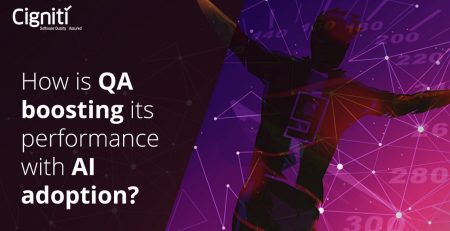Top 5 AI Use Cases in Healthcare for Improving Patient Care & Hospital Efficiency
Artificial Intelligence (AI) is revolutionizing the way healthcare is delivered today. The industry’s data-driven evidential approach to medicine combined with AI is set to transform both the practice of medicine and how the treatment is delivered.
AI is already being used to reinvent how people manage their health and access care, automate care delivery plans, and help with tedious tasks. It has the potential to reduce medical errors, enhance diagnostic effectiveness and results, aid in revenue optimization, and simplify processes.
Powerful and revolutionary developments are being made in healthcare today. Combining insights and shared knowledge with data from individual healthcare experiences help improve care delivery. These capabilities produce a force multiplier effect that feeds more data into insight development and knowledge sharing.
According to a report by the American National Library of Medicine, it is estimated
that AI applications can cut annual U.S healthcare costs by $150 billion in 2026.
AI: A major disruptor in Healthcare
A single technology cannot be used to describe AI. Instead, it covers a wide range of research fields and technological advancements that support functions like voice recognition, natural language processing (NLP), image processing, and others.
These areas profit from algorithmic advancements, ample computing power, and sophisticated analytical techniques like machine learning (ML) and deep learning.
Although true AI, defined as “the ability of a machine to imitate intelligent human behavior,” is still elusive, Gartner believes that AI is on the verge of becoming one of the most significant transformational forces in the healthcare industry.
The AI/smart machine age, according to Gartner, will be the most disruptive in IT history. Given concurrent developments in genomics, immunotherapy, nanomedicine, sensors, and so many other significant advancements within a similar time trajectory, the disruption is expected to impact the healthcare industry significantly, especially its already overworked professionals.
Through constant monitoring and coaching, AI-based technology will play a significant part in assisting individuals in maintaining their health by ensuring earlier diagnosis, customized treatments, and more effective follow-ups.
Top 5 AI use cases in Healthcare
With AI spending in the healthcare and pharmaceutical industries expected to increase from $463 million in 2019 to over $2 billion by 2025, let us look at the top 5 critical AI applications in healthcare.
1. AI-controlled robotic surgeries
A revolution in the surgical sector has been brought about by AI technology in the form of collaborating robots. When making little incisions, the revolution may be noticed in terms of depth and cutting rate.
In general, the expertise of the surgeon can alter the outcome of surgery, especially one involving a novel or complicated procedure. Even the most talented surgeons can operate more efficiently when AI is used to reduce case-to-case variances.
AI robots reduce the possibility of tremors or other unintentional movements during surgery since they are precise. For instance, AI-controlled robots are able to conduct fundamental tasks like precise cutting and sewing while functioning with more accuracy and miniaturization.
Robotic surgery with AI assistance was used by surgeons at the Maastricht University Medical Center in the Netherlands to close blood arteries that were only .03 to .08 mm wide. Furthermore, AI-powered computers can create novel surgical techniques using information from previous procedures.
2. Precision medicine for chronic diseases
One of the most useful applications of AI in healthcare is precision medicine. It is based on the massive volumes of data generated by a number of disruptive technical advancements, including affordable genome sequencing, cutting-edge biotechnology, and patient-owned home health devices.
Keep in mind that deep learning techniques for powerful supercomputing are the foundation of precision medicine. As a result, it makes use of doctors’ cognitive skills on a new level. Intel has created a deep learning algorithm in partnership with Scripps Research Institute, located in California, USA.
With 85% accuracy, it could locate 23 people who were at high risk for cardiovascular disease but were missed by conventional statistical techniques.
3. Workflow automation of administrative operations
One use of AI in healthcare is the automation of administrative operations. It ensures that healthcare professionals give priority to important work, allowing physicians, assistants, and nurses to spend less time on mundane duties. The healthcare sector might save around $18 billion as a result of AI applications.
Over 90% of doctors believe that tedious administrative work is the primary cause of their burnout. The operating room does not define a hospital. Healthcare personnel must handle a number of tedious administrative chores, such as billing and patient appointments.
Both clinical and non-clinical staff will benefit from the use of AI for administrative activities. With the least amount of user intervention, an AI-based system can manage all the repetitious administrative chores. Healthcare personnel will be able to concentrate on high-initiative jobs in a healthcare setting that needs a human aspect.
4. AI-enabled chatbots in primary care
Through chatbots, artificial intelligence has the potential to improve primary care and triage. With the use of chatbots, engaging with patients is quite easy and provides rapid conversational replies. By avoiding unnecessary trips to the doctor, they may save money. Chatbots can even help healthcare practitioners meet patients’ expectations while enhancing patient outcomes if they are used properly.
Chatbots encourage patients to contribute their health information proactively by using an all-in-one communication strategy, which enables doctors to improve patient care quality, lower costs, and increase patient happiness.
Thus, primary care may be automated and run smoothly thanks to AI, freeing up clinicians to concentrate on serious and urgent patients. Additionally, AI healthcare solutions are adopting a more humane stance. In order to give patients compassionately, round-the-clock assistance, hospitals might use digital humans as health aides.
5. 24/7 virtual nursing assistant
The market for virtual assistants in healthcare is anticipated to grow from around $600 million in 2021 to over $5 billion by 2028. We may in some ways “credit” the COVID-19 epidemic for the rise in popularity of intelligent assistants.
Healthcare professionals were overburdened since most conventional health centers were closed. Both patients with Coronarivus infections and patients who could only communicate with their doctors via phone or video chat had to be taken care of by them.
Patients needed someone to talk to, whether it was for a prescription for the medications they were taking or just advice on how to act in an unusual circumstance. virtual assistants proved to be a (literally) lifesaving device for this reason.
Virtual assistants can assist with a number of different activities outside of maintaining patients’ data, including:
- Scheduling medical treatments and doctor’s appointments, as well as offering patients the option to postpone or cancel them.
- Addressing any inquiries patients may have regarding their appointments, such as “How should I get ready for my visit?”
- Questioning patients about their healing progress and reminding them of any post-visit or discharge responsibilities.
- Reducing wait times by inquiring in advance about symptoms and relaying that information to the doctor.
- Enabling those suffering from chronic conditions to renew their medicines without going to a clinic.
Doctors and nurses will have much more time to care for their patients instead of performing administrative activities if virtual assistants are used to managing all of those tasks for healthcare staff.
Virtual healthcare assistants are a great tool to guarantee that patients know what to do after every appointment and allay their concerns about health symptoms since they are accessible 24/7 and will patiently answer questions or doubts as many times as necessary.
AI to be a game changer in healthcare
The global market size for AI in healthcare is projected to increase from $4.9 billion in 2020 to $45.2 billion in 2026. The use of AI in the healthcare sector is crucial because it helps improve diagnosis accuracy, makes clinicians more accessible, and organizes patient data.
With a decade of real-world experience, we at Cigniti know how to use AI in healthcare to benefit patients, physicians, researchers, and support personnel. Our team is proficient in a variety of AI subsets and relies on industry best practices to develop cutting-edge AI healthcare solutions that improve care delivery and medical research in a secure, ethical, and patient-safe manner.
Learn more about our digital solutions that can deliver simpler, faster, and safer interactions to your customers. Contact us today!





Leave a Reply